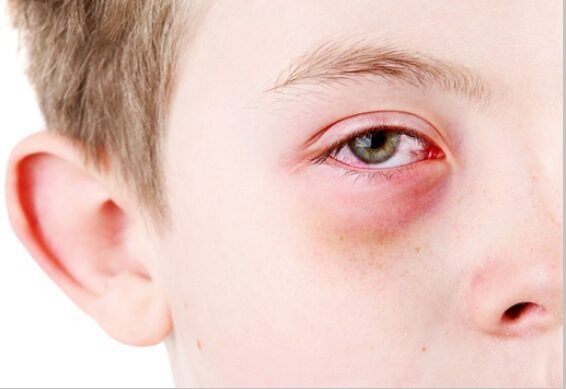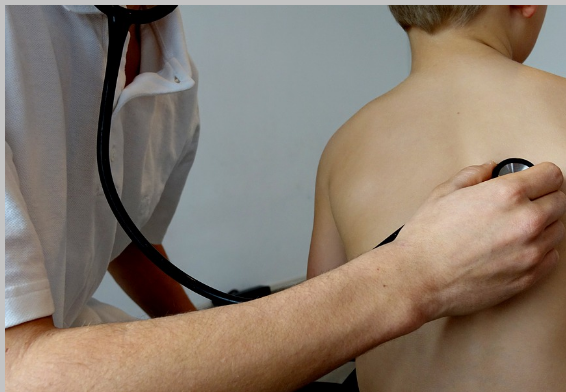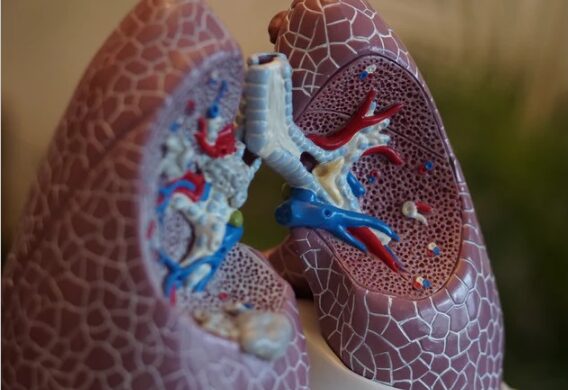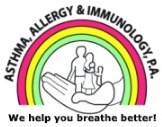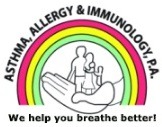Welcome to Asthma, Allergy & Immunology P.A
A Leader in immunological medicine throughout Central Florida.
With over 30 years of experience serving communities in Kissimmee and St. Cloud.
What we care for
Our Featured Services

Allergies
Also called allergic conjunctivitis or ocular allergy, eye allergy occurs when something you are allergic to irritates the conjunctiva.
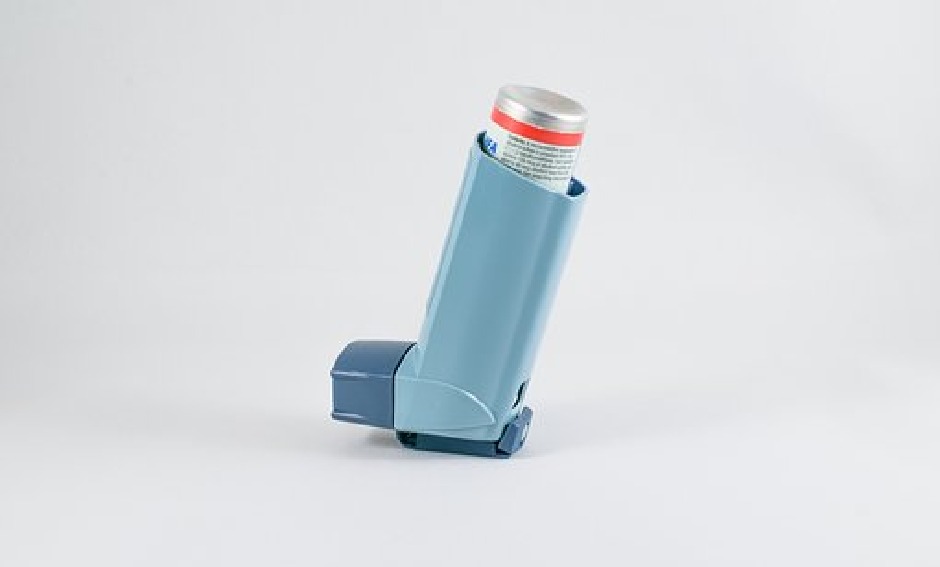
Asthma
Asthma is a chronic disease involving the airways in the lungs. These airways, or bronchial tubes, allow air to come in and out of the lungs.

Skin
Skin irritations are caused by a variety of factors. These include heat, immune system disorders, medications and infections.
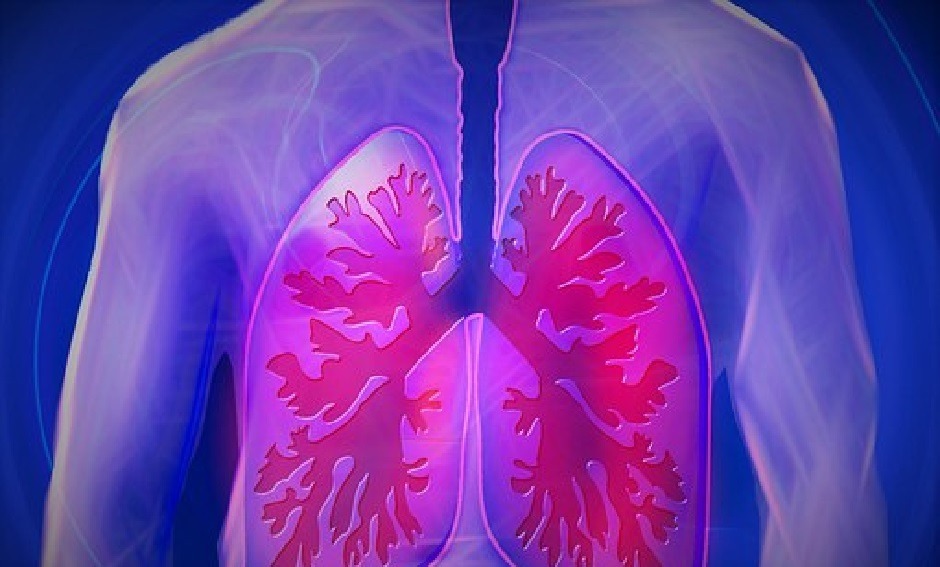
Lungs
The immune system perceives a threat and reacts in a variety of ways. A respiratory or lung allergy causes multiple symptoms.

Sinus
Sinusitis means your sinuses are inflamed. The cause can be an infection or another problem. Your sinuses are hollow air spaces.

Immune Deficiency
According to the leading experts in immunology, when part of the immune system is either absent or not functioning properly.
About Us
Delivering world class healthcare .
Welcome to Asthma, Allergy & Immunology P.A. a leader in immunological medicine throughout Central Florida. With over 30 years of experience serving communities in Kissimmee and St. Cloud, FL, Dr. Ahmed and his team of specialists are dedicated to bringing good health your way. With a wide range of evaluations and treatments, Allergy & Immunology P.A combines expertise and compassion to ensure that each patient receives the right treatment at the right time. With two convenient locations, schedule your appointment today!
PATIENT RESOURCES
We accept MOST insurance plans.*
We DO NOT accept Medicaid GOLD plans.
We encourage you to call your insurance plan and ask if we are IN NETWORK with them. When calling insurance, please provide this NPI number to confirm eligibility for being IN NETWORK: NPI —> 1922071158
*Please note: while we do all we can to confirm insurance benefits, insurance eligibility is not guaranteed until claims are fully processed. Patient or financial guarantor will be held fully responsible for any amount that is left after claims are processed.
Our List of Accepted Insurance Plans<
⦿Blue Cross
Blue Shield
⦿Cigna
⦿Aetna
⦿Freedom
⦿CarePlus
⦿Humana
⦿Tricare
⦿Florida Hospital
Care Advantage
⦿Staywell
⦿Medicare & AARP
⦿Simply
⦿Wellcare
⦿United Healthcare
Dr. Imtiaz Ahmed Professional Information
EDUCATION AND CERTIFICATES
- Certification and Licensure: – Aug 2018: Recertified with ABAI – Dec 2005: Recertified – American Board of Asthma Allergy and Immunology – Oct. 09, 1995: American Board of Asthma, Allergy & Immunology #3743 – Oct. 28, 1992: American Board of Pediatrics #219128 – Jan. 1991: Florida State Medical License #ME 0058868 – Jun. 1991: Louisiana State Medical License #08669R – Jan. 1985: Government Medical College, University of Mysore, India – 1988: ECFMG (Educational Comm for Foreign Medical Graduates)
- Education: – July 1991 – June 1993: Allergy & Immunology Fellowship, LSU Medical Center, New Orleans, LA – July 1990 – June 1991: Chief Resident in Pediatrics, The Methodist Hospital, Brooklyn, NY – July 1988 – June 1990: Resident in Pediatrics, The Methodist Hospital, SUNY, Brooklyn, NY – Sept. 1979 – June 1985: M.D., Government Medical College, University of Mysore, India – July 1976 – April 1979: BSc, Bangalore University, Bangalore, India
- Professional Experience: – July 2017–Present: Assistant Clinical Professor of Pediatrics, UCF School of Medicine, Orlando, FL – Oct. 2012–Present: Adjunct Clinical Assistant Professor, LECOM, Bradenton, FL – Jan. 2011–Present: Volunteer Faculty, UCF College of Medicine, Orlando, FL – Nov. 2003–2005: President, American Association of Allergist & Immunologist from India – July 1993–Present: Private Practice, Asthma, Allergy, & Immunology, P.A., Kissimmee, FL – July 1991–1993: Pediatrics ER Staff, Charity Hospital, New Orleans, LA – July 1991–1993: Supervisor of Pediatric Residents, Charity & Children’s Hospital, New Orleans, LA
EXPERIENCE AND PUBLICATIONS
- Staff Consultant in Allergy & Immunology: – 2009–Present: Tazkiya Shepherd’s Hope Clinic, Ocoee, FL – 1993–1995: Humana Hospital, Kissimmee, FL – 1993–Present: Florida Hospital, Kissimmee, FL – 1993–2010: Sand Lake Hospital (ORMC), Orlando, FL – 1995–2005: Celebration Hospital, Orlando, FL – 1995–2005: St. Cloud Regional Medical Centers, St. Cloud, FL – 1995–Present: Osceola Regional Medical Center, Kissimmee, FL
- Drug Clinical Study: – 1997–2002: Salmeterol Multicenter Asthma Research Trial (SMART) – 2000: Allegra Target II Study – 2001–2003: Xopenex Patient Registry Study
- Publications: – Ahmed, I., et al. *Care of Asthma: Allergy Clinic vs. Emergency Room*, Annals of Allergy, Asthma, & Immunology, Vol. 78, No. 4, Apr. 1997 – Ahmed, I., et al. *Successful Treatment of Cryptosporidiosis in an Immunodeficient Patient with Short Limb Dwarfism*, Annals of Allergy 70:52, 1993 – Ahmed, I., et al. *Severe Abnormal Behavior as Presenting Symptoms of X-linked Lymphoproliferative Syndrome*, J. of Allergy and Clinical Immunology, 91:144, 1993 – Ahmed, I., et al. *Atopic Dermatitis in an Exclusively Breast Fed Infant* – Ahmed, I., & R.U. Sorensen. *Insect Sting Allergy*, Chapter in *Principles & Practices of Tropical Allergy & Asthma*
- Presentations: – Louisiana Allergy Society 19th Annual Meeting, New Orleans, June 28, 1992: “Short Limb Dwarfism, Immunodeficiency and Cryptosporidiosis” – 50th Annual Meeting of American College of Allergy and Immunology, Chicago, Nov. 16, 1992: “Successful Treatment of Cryptosporidiosis in an Immunodeficient Patient with Short Limb Dwarfism” – ACAAI VIII International Food Symposium, Denver, July 1993: “Atopic Dermatitis in an Exclusively Breastfed Infant”
HONORS & RESEARCH
- Honors and Awards: – 2005: Lifetime Achievement Award AAAII – 2000: Member at Large, Medical Executive Committee, Osceola Regional Medical Center, Kissimmee, FL – 1991: Certificate of Merit, Outstanding Resident, Methodist Hospital, Brooklyn, NY – 1990–1991: Awarded Outstanding Resident of the Year – 1984: First Class in Internal Medicine – 1980–1984: Awarded ALAMEN Foundation Scholarship – 1983: Distinction in Pharmacology – 1981: First Class in Physiology – 1979: First Class in Bachelor of Science Degree – 1974: Distinction in English
- Professional Membership: – American College of Asthma, Allergy & Immunology – American Academy of Asthma, Allergy & Immunology – Joint Council of Asthma, Allergy & Immunology – Florida Medical Association – Florida Asthma, Allergy & Immunology Society – Osceola County Medical Society
- Research Interest: – Primary Immunodeficiency Diseases – Milk Allergy in Infants at Risk – Asthma Care in Urban Population – Care of Asthma: Allergy Clinic vs. Emergency Room – Insect Allergy and Atopic Dermatitis
Asthma is a chronic disease involving the airways in the lungs. These airways, or bronchial tubes, allow air to come in and out of the lungs. We provide all forms of Asthma Evaulation and Treatment. If you have asthma your airways are always inflamed. They become even more swollen and the muscles around the airways can tighten when something triggers your symptoms. This makes it difficult for air to move in and out of the lungs, causing symptoms such as coughing, wheezing, shortness of breath and/or chest tightness.
The most common causes of allergic conjunctivitis are seasonal allergens such as pollen and mold spores. People with seasonal allergic rhinitis (hay fever) normally notice their symptoms worsen when they go outdoors on days with high pollen counts. Indoor allergens such as dust mites and pet dander can also cause eye allergies year-round. If you suffer from this type of allergy, you may notice your symptoms worsen during certain activities such as cleaning your house or grooming a pet. Eye allergy symptoms can be very annoying. Yet they pose little threat to eyesight other than temporary blurriness. Unlike conditions such as pink eye, allergic conjunctivitis is not contagious. However, red, itchy, burning and puffy eyes can be caused also by infections and other conditions that can threaten eyesight.
Skin irritations are caused by a variety of factors. These include heat, immune system disorders, medications and infections. When an allergen is responsible for triggering an immune system response, the irritation is an allergic skin condition.
Dermatitis (Eczema) or Allergic Contact Dermatitis occurs when your skin comes in direct contact with an allergen. For instance, if you have a nickel allergy and your skin comes in contact with jewelry made with even a very small amount of nickel, you may develop red, bumpy, scaly, itchy or swollen skin at the point of contact.
The immune system perceives a threat and reacts in a variety of ways. A respiratory or lung allergy causes symptoms directly reflected in how a person breathes. Pollen, a major trigger for asthmatics, stimulates white blood cells to release a substance called histamine. This irritating substance produces a stuffy nose and itchy, watery eyes. In people with asthma, histamine can also cause a list of additional allergy symptoms, which usually occur soon after exposure. Examples of airborne allergens that cause respiratory allergy symptoms include pollens, animal dander, dust mites, and mold spores.
Sinusitis means your sinuses are inflamed. The cause can be an infection or another problem. Your sinuses are hollow air spaces within the bones surrounding the nose. They produce mucus, which drains into the nose. If your nose is swollen, this can block the sinuses and cause pain.
There are several types of sinusitis:
– Acute, which lasts up to 4 weeks: Acute sinusitis often starts as a cold, which then turns into a bacterial infection.
– Subacute, which lasts 4 to 12 weeks
– Chronic, which lasts more than 12 weeks and can continue for months or even years: Allergies, nasal problems, and certain diseases can also cause acute and chronic sinusitis.
– Recurrent, with several attacks within a year
According to the leading experts in immunology, when part of the immune system is either absent or not functioning properly, it can result in an immune deficiency disease. When the cause of this deficiency is hereditary or genetic, it is called a primary immunodeficiency disease (PIDD). Researchers have identified more than 150* different kinds of PIDD.
The immune system is composed of white blood cells. These cells are made in the bone marrow and travel through the bloodstream and lymph nodes. They protect and defend against attacks by “foreign” invaders such as germs, bacteria and fungi.
